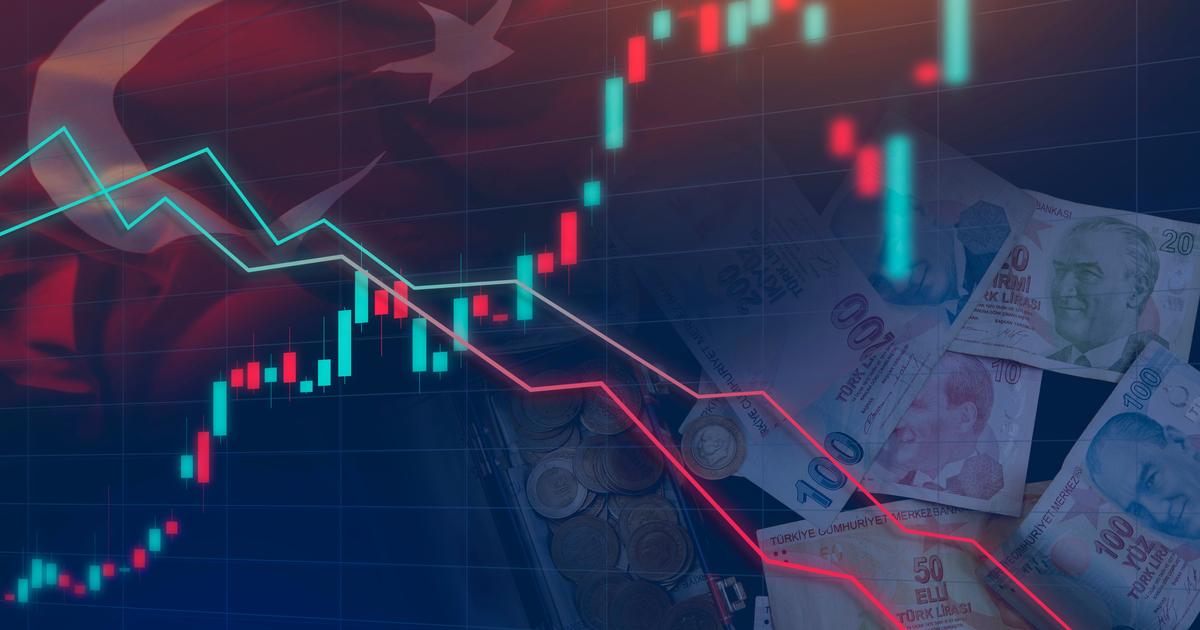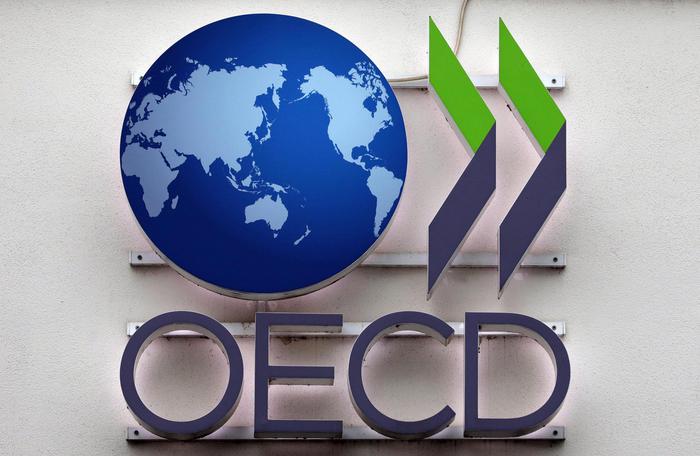Gross Domestic Product: What is GDP and how is it calculated?
Created: 03/30/2022Updated: 03/30/2022 15:02
A crane loads containers (symbolic image) © Uwe Anspach / dpa
In Germany, both the Corona crisis and the Ukraine war are having an impact on the German economy.
Interesting facts about the GDP as a reflection of the economic performance of an economy.
Berlin - "BIP" - three letters with great meaning and effect.
But what do they actually mean?
The GDP (Gross Domestic Product) serves as a measure of the economic growth of the respective country or region.
Fluctuations - compared to previous phases such.
B. years - give good indications of the development of the economy.
As a result, the gross domestic product is primarily a measure of production and measures the domestic production of goods and services after deducting all intermediate consumption.
In concrete terms, this means: It measures the value of the goods and services produced domestically (value added), provided these are not used as inputs for the production of other goods and services.
Gross domestic product – what does GDP say?
Gross domestic product (GDP) is a measure of the economic performance of an economy over a period of time and is the central figure in national accounts.
In concrete terms, this means: The GDP measures the value of the goods and services produced domestically (value added), insofar as these are not used as inputs for the production of other goods and services.
Some figures, data and facts about GDP in Germany:
In 2021, the gross domestic product (GDP) in Germany was around 3.57 trillion euros.
Price-adjusted, German gross domestic product grew by 2.9 percent in 2021 compared to the previous year.
In the previous year, Germany's economic output fell significantly for the first time after ten years of economic growth in a row. The reason for this was the effects of the Corona crisis and the associated shutdown of the economy.
The gross value added of the economy in Germany was around 3.23 trillion euros in 2021.
The economic sector with the largest share was the service sector with approx. 2.25 trillion euros in gross value added.
Total consumer spending in Germany in 2021 amounted to around 2.46 trillion euros, almost 69.5 percent of which was private consumer spending.
In 2021, the national income in Germany was around 2.56 trillion euros, higher than in the pre-crisis year 2019. Compensation of employees in Germany also rose to around 1.92 trillion euros in 2021.
The employment rate in Germany in 2021 was 55.7 percent.
The amount of disposable income in Germany in 2021 was almost 2.94 trillion euros.
Gross Domestic Product - Types of Calculation
The gross domestic product can be determined in three different ways.
However, all calculation methods lead to the same result.
# production calculation
Here the economic performance is shown from the production side.
The central variable is the gross value added.
It is determined from the sum of all productions minus advance payments.
The table shows the gross value added by sector for Germany in 2007:
Production value €4,454.57 billion
- intermediate consumption - €2,282.39 billion
= gross value added €2,172.18 billion
+ taxes on goods less
Subsidies on goods €251.62 billion
= gross domestic product €2,423.80 billion
# usage invoice
Here the calculation is based on the demand side.
The use for goods and services is determined.
The table shows the components of the usage calculation on the left, the values on the right correspond to their size in Germany's national GDP in 2007:
Private consumer spending €1,374.40 billion
+ government consumer spending €436.10 billion
+ gross investment €442.50 billion
+ exports €1,133.00 billion
− imports − €962.20 billion
+ = external contribution
€170.80 billion €
170.80 billion
= gross domestic product
€2,423.80 billion
# Distribution calculation
Here, GDP is measured by income generated.
The distribution is based on national income.
The table shows the components of the distribution calculation on the left and the associated data from 2007 on the right: Compensation of
employees €1,181.0 billion
+ corporate and property income €643.2 billion
= national income €1,824.2 billion
+ production and import data to the state
less subsidies €277.0 billion
+ depreciation €345.2 billion
= gross national income €2,446.4 billion
- balance of primary income from the rest of the world €22.6 billion
= gross domestic product €2,423.80 billion
Gross domestic product – the GDP in Germany in 2021
As late as 2020, Germany's economic output fell significantly for the first time after ten years of economic growth in a row.
The main reason for this was the effects of the Corona crisis and the associated decline in the economy.
Before 2020, GDP had last declined in 2009 when Germany, like most other countries worldwide, was hit by the effects of the global financial and economic crisis.
The gross domestic product per capita in 2021 was around 42,918 euros.
In the fourth quarter of 2021, seasonally and calendar adjusted gross domestic product was around 917 billion euros.
Adjusted for price, seasonal and calendar effects, GDP fell by 0.3 percent in the fourth quarter of 2021 compared to the previous quarter, and in the second quarter of 2020 it collapsed by 10.0 percent due to the Corona crisis.
Gross domestic product - the effects of the Corona crisis
The German economy slipped into a deep recession in 2020 as a result of the corona pandemic.
In order to curb the spread of the corona virus in Germany, far-reaching restrictions on economic activities were decided and ordered in March 2020.
This economic shutdown due to the Corona crisis affected large parts of companies and the self-employed in Germany.
After a decline in the number of infections, easing was gradually implemented nationwide.
In November, however, the restrictions had to be tightened again due to the renewed increase in the number of infections.
The consequences of the pandemic for the German economy were serious overall, with GDP falling by 4.6 percent in 2020 compared to the previous year.
Gross domestic product – forecast for 2022
In mid-March 2022, the ifo Institute published a forecast for 2022 as a whole, expecting economic growth of 3.1 percent.
In the following year, 2023, GDP is expected to increase by a further 3.3 percent compared to the previous year.
Other institutes and facilities are also expecting a similar development in gross domestic product over the next one to two years.
However, due to the effects of the war in Ukraine, forecasts for the German economy are difficult.
Gross domestic product - the GDP in Germany from 1991 to 2021
2021: 3,570.62 billion euros
2020: 3,367.56 billion euros
2019: 3,473.35 billion euros
2018: 3,367.86 billion euros
2017: 3,267.16 billion euros
2016: 3,134.74 billion euros
2015: 3,026.18 billion euros
2014: 2,927.43 billion euros
2013: 2,811.35 billion euros
2012: 2,745.31 billion euros
2011: 2,693.56 billion euros
2010: 2,564.4 billion euros
2009: 2,445.73 billion euros
2008: 2,546.49 billion euros
2007: 2,499.55 billion euros
2006: 2,385.08 billion euros
2005: 2,288.31 billion euros
2004: 2,262.52
billion euros
2003: 2,211.57 billion euros
2002: 2,198.12 billion euros
2001: 2,172.54 billion euros
2000: 2,109.09 billion euros
1999: 2,059.48 billion euros
1998: 2,014.42 billion euros
1997: 1,961.15 billion euros
1996: 1,921.38 billion euros
1995: 1,894.61 billion euros
1994: 1,829.55 billion euros
1993: 1,750.89 billion euros
1992: 1,702.06 billion euros
1991: 1,585.8 billion euros















